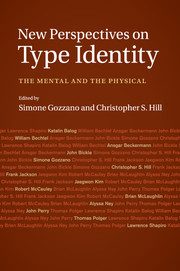12 results
THE VIRTUE OF RUNNING A MARATHON
-
- Article
-
- You have access
- HTML
- Export citation
Index
-
- Book:
- New Perspectives on Type Identity
- Published online:
- 05 April 2012
- Print publication:
- 08 March 2012, pp 288-294
-
- Chapter
- Export citation
New Perspectives on Type Identity - Title page
-
-
- Book:
- New Perspectives on Type Identity
- Published online:
- 05 April 2012
- Print publication:
- 08 March 2012, pp iii-iii
-
- Chapter
- Export citation
Contents
-
- Book:
- New Perspectives on Type Identity
- Published online:
- 05 April 2012
- Print publication:
- 08 March 2012, pp vii-viii
-
- Chapter
- Export citation
Introduction
-
-
- Book:
- New Perspectives on Type Identity
- Published online:
- 05 April 2012
- Print publication:
- 08 March 2012, pp 1-15
-
- Chapter
- Export citation
Copyright page
-
- Book:
- New Perspectives on Type Identity
- Published online:
- 05 April 2012
- Print publication:
- 08 March 2012, pp iv-iv
-
- Chapter
- Export citation
Dedication
-
- Book:
- New Perspectives on Type Identity
- Published online:
- 05 April 2012
- Print publication:
- 08 March 2012, pp v-vi
-
- Chapter
- Export citation
Chapter 5 - Type-identity conditions for phenomenal properties
-
-
- Book:
- New Perspectives on Type Identity
- Published online:
- 05 April 2012
- Print publication:
- 08 March 2012, pp 111-126
-
- Chapter
- Export citation
Contributors
-
-
- Book:
- New Perspectives on Type Identity
- Published online:
- 05 April 2012
- Print publication:
- 08 March 2012, pp ix-ix
-
- Chapter
- Export citation

New Perspectives on Type Identity
- The Mental and the Physical
-
- Published online:
- 05 April 2012
- Print publication:
- 08 March 2012
Acknowledgements
-
- Book:
- New Perspectives on Type Identity
- Published online:
- 05 April 2012
- Print publication:
- 08 March 2012, pp x-x
-
- Chapter
- Export citation
New Perspectives on Type Identity - Half title page
-
- Book:
- New Perspectives on Type Identity
- Published online:
- 05 April 2012
- Print publication:
- 08 March 2012, pp i-ii
-
- Chapter
- Export citation



